"Slave Wars" in the ancient world. Uprising to Spartacus. (Part one)
The field of the crucified. F. Bronnikov (1827 - 1902). 1878 year.
Well, you have to start with the fact that Spartak was far from the first, although the most famous leader of the slave uprising. But how often did slaves rise in ancient Rome? It turns out - very often! We can say that they walked just continuously, one after the other! For example, in Dionysius of Halicarnassus we read that slaves in Rome rebelled already in 501, and this revolt lasted right up to 499 BC. er That is, it happened at the dawn of the Roman stories, after just 250 years since its inception. But it must be borne in mind that at first there were slaves there once or twice, and miscalculated, and then slavery had a patriarchal character there. So 250 years is just the time for which the slaves in Rome became ... a lot! Well, then, after the first uprising in 458 G. BC. e., that is, 40 years later, followed by a second big uprising led by Gerdonius, to the fight with which two Roman consuls elected this year were sent at once, that is, its scale was far from small! Other Roman historians have reported a slave conspiracy that took place in 419 BC. er already in Rome itself. The conspirators wanted to set Rome on fire in different places at night, cause panic, then seize the Capitol and other vital centers of the city, and then kill all their masters, and share their property and their wives equally. All downright according to V.I. Lenin and ... Sharikov! But such a carefully designed conspiracy broke down: as always, there was a traitor who betrayed everyone, after which the instigators were captured and executed.
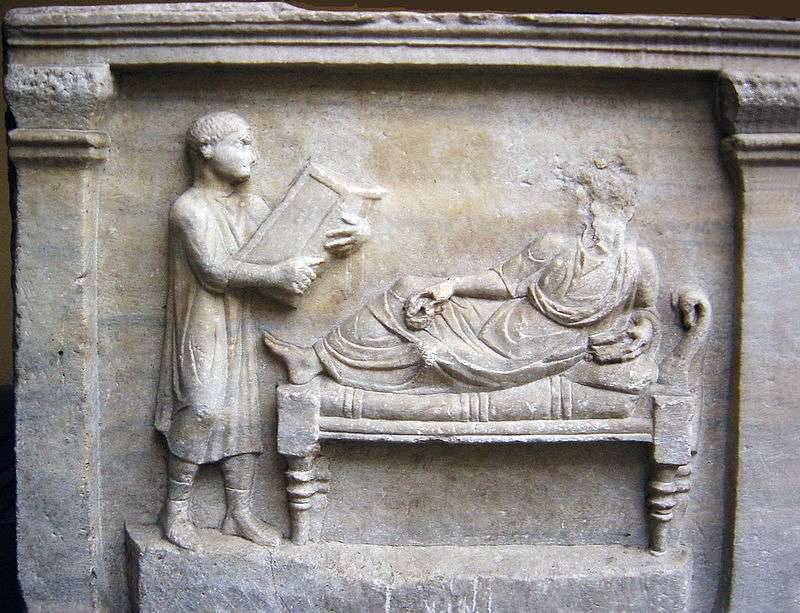
Slave brings lord sign for the letter. Detail of the sarcophagus of Valery Petroninus. Archaeological Museum in Milan.
It should be noted here that the wealth of Rome was based on the most ruthless robbery of the captured lands, from where not only gold-silver but also slaves in large quantities came. For example, when the Romans took Tarent, 30 was immediately sold to thousands of people as slaves. The defeat of the Macedonian king Perseus in 157 BC. er gave the same amount. Sempronius Gracchus - the father of the famous freedom-loving brothers Gracchus, in 177 BC. e., being in Sardinia, captured more than 30 thousands of inhabitants of the island and all turned into slaves. Titus Livius wrote that at that time there were so many slaves that the word "Sardinian" became a household word for any cheap product, and in Rome they began to say "cheap as a sard."
But the pursuit of slaves had its negative consequences, because not only peasants but also intelligent and educated people fell into slaves. So, in 217 BC. Oe., when Rome led the second Punic War, which required considerable tension and strength from it, in Rome a conspiracy of slaves arose, reported by Titus Livius. The slaves decided to take advantage of the plight of their masters and stab them in the back. The conspiracy failed again because of one slave who received an award for treason - “no, not a basket of cookies and not a jar of jam”, freedom from slavery and money - a great monetary reward, so being a traitor among the slaves was very profitable and By the way, about how profitable it is to betray comrades, slaveholders informed slaves regularly! It is believed that the instigator of the upcoming uprising was a Carthaginian, who sought in this way to help compatriots.
They punished him “witty”: they chopped off his hands and sent him back to Carthage, so at least that was the case, but he gained his freedom, but the rest of 25 were less fortunate slaves-conspirators, and they were hanged. Probably, many more slaves participated in the plot, only they could not be found.
In 198 BC in the city of Setia, not far from Rome, as all again, Tit Livy, reports, another slave performance was being prepared. It so happened that it was there that the hostages were settled from among the Carthaginian nobility in order to ensure the inviolability of the peace treaty between Rome and Carthage. And here there were many Carthaginian slaves captured during the war. It was these slaves that the Carthaginian hostages began to agitate to raise a rebellion. Since the instigators were the Carthaginian slaves - people of the same nationality and one language, so it was easy for them to agree among themselves. According to the plan of the conspirators, the uprising was to begin simultaneously in Setii, Norba, Circe, Preneste - cities near Rome. Scheduled even the day of performance. In the Network, it was supposed to start during the holiday with public games and theatrical performances, where residents of closely located cities were to come. While the Romans were to be entertained with games, slaves needed to capture important objects of the urban infrastructure. But this uprising was also thwarted, because now the plan of the uprising was already issued by two and reported to the Roman praetor Cornelius Lentulus. Roman slave owners, when they learned about the next conspiracy, gripped indescribable fear. Lentulus was presented with extraordinary powers and tasked with the most brutal way to deal with the conspirators. He immediately assembled a detachment of two thousand people, arrived in Networks and began the massacre. Together with the leaders of the uprising seized and executed about two thousand slaves, and for the execution was enough the slightest suspicion of a conspiracy. It seems that the rebellion was suppressed, but as soon as Lentoul left for Rome, he was informed that part of the conspirators had survived among the slaves and was preparing to revolt in Prenest. Lentul went there and put to death more 500 slaves.
Two years later, slaves rose in Etruria, north of Rome, and the Romans had to send a whole legion there, indicating its mass character. Roman troops were given desperate resistance. Moreover, the slaves entered into a very real battle with the legionnaires. Titus Livy later wrote that the number of those killed and taken prisoner was very large. The leaders of the uprising, according to tradition, were crucified on crosses, and all the rest were returned to their masters for punishment.
From 192 - 182 BC. the slaves' performances took place almost continuously in southern Italy (in Apulia, Lucania, Calabria). The Senate regularly sent troops there, but could not do anything. It got to the point that in 185 BC. I had to send there with the troops of praetor Lucius Postumius as if for a war. The center of the conspiracy was in the area of the city of Tarenta, where the 7000 captured slaves, many of whom were executed.
However, neither such a penalty nor the natural decrease in the number of slaves in Rome did not reduce. On the contrary, it only steadily increased, and with it the danger of new speeches, conspiracies and murders. For example, in the satirical novel of Petronius, who already lived under Emperor Nero, a rich freedman was depicted who looked at the lists of slaves born in his vast estate and found out that in just one day he had more slaves for 30 boys and 40 girls. Other slave owners could put whole armies of slaves, so many of them belonged to them. And it is not surprising, since only after Emilia Pavel went to Epirus, 150 thousands of prisoners were turned into slaves, and such a commander as Marius, who defeated the Cimbrians and Teutons in northern Italy, made 90 thousands of Tembons slaves and captured by them as slaves! Lucull in the lands of Asia Minor and in Ponte captured so many people that they began to sell slaves in the markets for just 60 drachmas (dram - 4 kopecks). So it is no wonder why the Romans, first of all, attacked unaffected by wars and densely populated, rich states, or the territories of “wild” peoples who could not resist them due to their lower culture.
Naturally, slaves in the lands of the Roman state were unevenly distributed. For example, there were a lot of them in Sicily, where they were engaged in agriculture, and whether it is necessary for him to be surprised that it was there that one after another two powerful uprisings of slaves took place. The first is the so-called "Evn uprising", which happened in 135 - 132 BC. er The head of the uprising was a former servant of Eubes, a Syrian by birth. The uprising began in Enna, where the rebels killed all of the worst slave owners, then chose Yevna as their king (after which he called himself “the king Antiochus” and the kingdom “Novosiriysky”) and even organized a council where slaves were chosen, “the most outstanding according to your mind. " The commander of the army was chosen by the Greek Ahei, who managed to quickly gather a large army, which was able to repel the units of the Roman army, sent to Sicily to pacify the rebels.
Slave, shackled, and so in them, and died during the eruption of Vesuvius. Plaster cast. Museum in Pompeii.
Naturally, the example turned out to be contagious, and revolts began to flare up throughout Sicily. Soon another center was formed with the center in the city of Agrigento, where Cilician Cleon headed it, under whose leadership gathered five thousand rebels. The slaveholders, however, decided that this would lead to civil strife and slaves would start fighting each other. But Cleon arrived in Enna and voluntarily submitted to Euna, and the combined army of slaves began to campaign against the Romans. Now it already had 200 thousands of people, that is, it represented a tremendous force. And even if ancient historians exaggerated this figure tenfold, there were still a lot of slaves. Much more than the Romans, so for five years they became in fact the masters of the whole island. Roman commanders suffered defeat after defeat. It was necessary to conduct a serious mobilization of forces, as if the enemy had invaded the country and sent two consular armies to Sicily, led by the consuls Cai Fulvius Flaccus, Lucius Calpurnius Piso and the successor of Piso - Consul Publius Rupilius.
The latter managed to defeat the slaves in several battles, after which he approached the city of Tavromeny and took him under siege. Stocks of supplies ran out quickly, but the slaves fought, nonetheless, desperately, and did not want to surrender to the enemy. But, as always, there was a traitor — the slave Serapion, who helped Rupilia to take Tavromeny, after which he went to the capital of the “Novosirian kingdom” - Enna. The defense of the city was led by Cleon and Ahei. Cleon made a sortie and “after a heroic struggle,” reports Diodorus of Sicily, “fell, covered with wounds.”
And here the treason helped the Romans, since it would be very difficult to take a city standing on a rocky hill, otherwise it would be very difficult. Yevna was captured, taken to the city of Morgantina, thrown into prison, where he died from the terrible conditions of detention.
While all this was happening, in 133 BC a rebellion broke out in Pergam under the leadership of Aristonica, which lasted until 130 BC. It is not known whether there was any connection between these two uprisings, but the fact that the Romans as a result had to fight on two fronts at once was certain. Diodorus of Sicily, describing this revolt of slaves in the Pergamon kingdom, said: "Aristonik sought imperial power of the royal power, and slaves insane with him thanks to the oppression of gentlemen and plunged many cities into great misfortune."
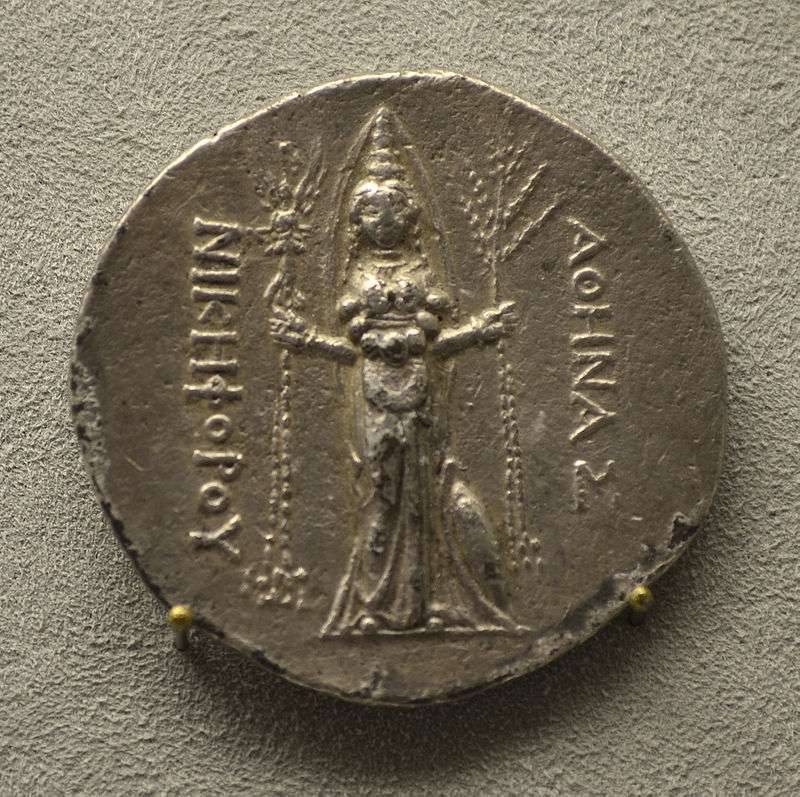
Tetradrachm of King Eumenes II 197 - 159 BC. Berlin, Museum of Pergamon.
As to the Pergamon kingdom, where such an important event took place, it was formed after the collapse of Alexander the Great in 280 BC. It was famous for its wealth, but its independence was elusive.
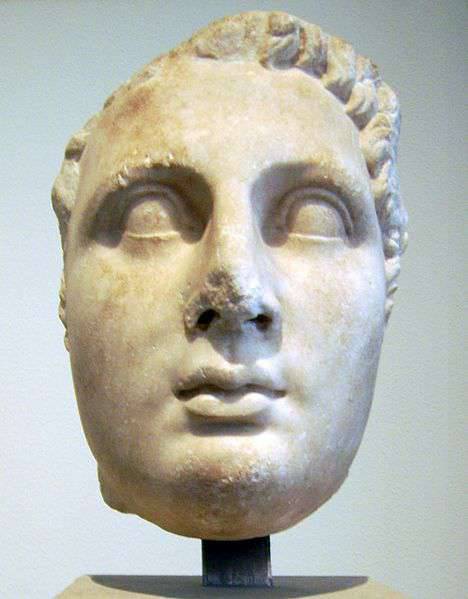
King Attal III. Berlin, Pergamon.
And when King Attal III died, and he bequeathed his kingdom to Rome, the cup of popular patience overflowed. An uprising began against the Romans, who was headed by Aristonik (the son of the Tsar's concubine), the Tsar’s side brother, who had the right to the throne of his brother under Greek law. On the side of Aristonica were many cities that did not want to fall under the power of the Romans: Levki, Kolofon, Mindos and others. Although Aristonik was brought up at the royal court, he did not disdain the common people and actively called in his army both slaves and poor people. As a result, his speech took on not only anti-Roman character, but in fact became an uprising of slaves and the poor. Interestingly, Tiberius Gracchus, a philosopher of Blossius, fled to Aristonik and became his adviser, although this, of course, does not mean that both of them were “revolutionaries”.
Nevertheless, Aristonica came up with a great idea: he declared that his goal was to create a "State of the Sun", where everyone would be equal. All its citizens were “citizens of the sun” (heliopolitans), which, however, is not surprising, since scalar cults were very popular in the East. Aristonik took many cities and won a number of victories over the Romans. Moreover, he even managed to crush the Roman army led by the consul Publius Licinius Crassus, and Krass himself considered himself so dishonored that he, in fact, initiated his murder and lost his head!
In 130 BC Consul Mark Perpern, a resolute and ruthless man, was sent to fight Aristonik. It was he who finally finished off the troops of the insurgent slaves in Sicily and crucified the vanquished on the crosses, so that the Senate hoped that it would be as successful in the East. And he did arrive in Asia Minor with all haste and with an unexpected blow, which Aristonik did not expect, defeated his troops. The leader of the uprising was forced to take refuge in the city Stratonikee. The city, of course, was besieged, then was forced to surrender, but Aristonica was captured and sent to Rome, he was strangled in prison on the orders of the Senate. Blossy did not survive the death of a friend, but he himself lost his life
(To be continued)
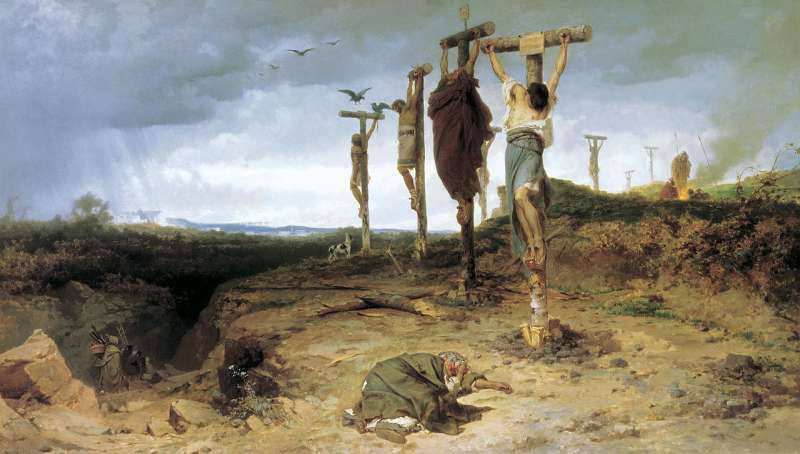
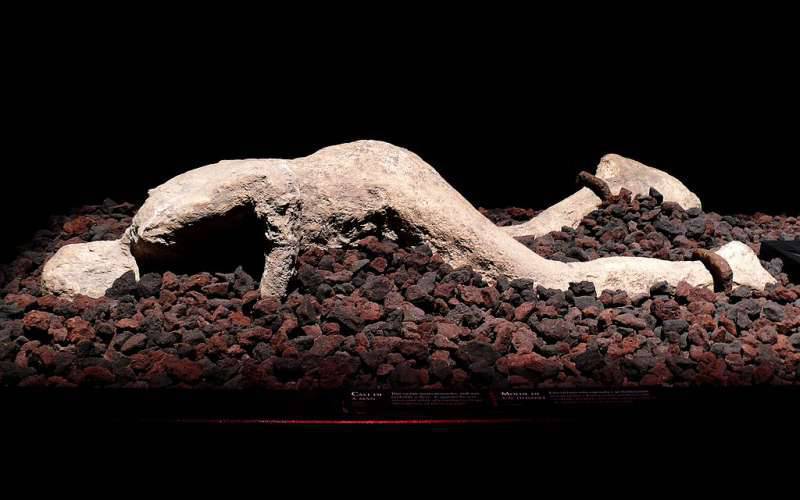
Information